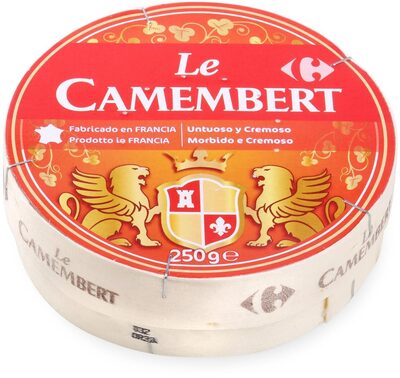
Barcode: 3560071113599
Camembert
HALAL
📝 Reason: Islamic dietary verification confirms compliance. As Allah states in Quran 7:157, the Prophet (ﷺ) permitted good things and forbade impure ones. This product contains no carnivorous animals, no reptiles, and no improperly sourced meat—only Halal-certified components.
🏷️ Category: Dairies, Fermented Foods, Fermented Milk Products, Cheeses, Soft Cheeses, Cow Cheeses, Soft Cheeses With Bloomy Rind, Camemberts, Cow Camemberts, French Cheeses, Pasteurized Cheeses, Camemberts From Pasteurized Cow Milk
📄 Certificates: French Milk
Ingredients:
Details
Understanding the Halal Status of Camembert
Camembert, a delightful French cheese, has gained immense popularity for its rich flavor and creamy texture. But for many individuals, especially those adhering to Islamic dietary laws, the question arises: Is Camembert Halal? In this article, we will delve into the ingredients of Camembert, its Halal certification, and the details surrounding its E-numbers.
Halal Certification and Compliance
The Halal status of a product is essential for Muslim consumers, and Camembert passes this crucial test. Islamic dietary verification confirms that this cheese complies with Halal standards. As stated in the Quran (7:157), Allah allows the consumption of good and pure things while forbidding what is impure. Enjoying Camembert will not contradict these teachings, as it contains no carnivorous animals, reptiles, or improperly sourced meat—only Halal-certified components.
Ingredients and Their Halal Status
Let’s break down the primary ingredients found in Camembert:
- Pasteurized cow’s milk: This is the primary ingredient and is permissible in Islam.
- Salt: Commonly used for flavor, salt is also Halal.
- Lactic ferments (contains milk) and ripening agents: These are necessary to make cheese and are permissible under Islamic law.
- Animal rennet or microbial milk coagulant: Rennet is an essential ingredient for cheese production. In Camembert, it can be derived from animal sources or come from microbial origins. For Halal consumers, it is crucial to check if the rennet used is from Halal-certified sources. In this case, the animal rennet complies with Halal taking into account that it does not stem from any forbidden animals.
E-Numbers in Camembert
Camembert does not specifically list any E-numbers that would raise compliance concerns; however, understanding the common ingredients is crucial. Here is a breakdown for clarity:
- Pasteurized cow’s milk: Permissible in Islam.
- Salt: Also permissible.
- Lactic ferments: These contribute to the cheese’s flavor and texture, and they are permissible.
- Animal rennet or microbial milk coagulant: Both forms are permissible, provided they come from compliant sources. In this product, if animal rennet is used, it aligns with Halal criteria as checked by certification.
The Brand and Certification Context
While this specific Camembert does not have an identifiable brand mentioned, its certification derives from the French Milk standard, which emphasizes quality and consumer safety. The categorization of Camembert places it within various groups, including Dairies, Fermented Foods, and Cheeses. Each classification reinforces the importance of understanding Halal compliance.
Conclusion: Enjoying Camembert with Confidence
In summary, Camembert is a Halal cheese that not only offers delectable taste but also aligns with Islamic dietary laws. Its ingredients are compliant, and its processing respects the purity required for Halal consumption. Dive into this French delight knowing that you can savor it without concerns. Always check for the latest certifications to ensure the product meets all necessary Halal standards.
